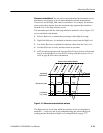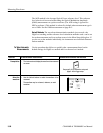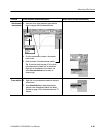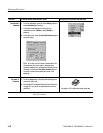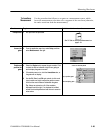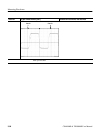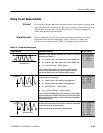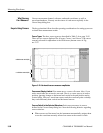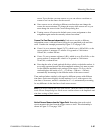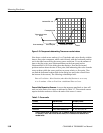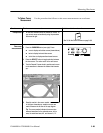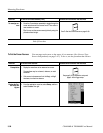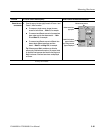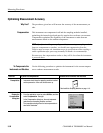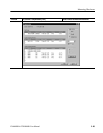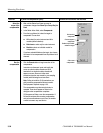
Measuring Waveforms
CSA8000B & TDS8000B User Manual
3-87
cursor. Up to the time you turn cursors on, you can select a waveform on
screen to use it as the source for the cursors.
H Once cursors are on, selecting a different waveform does not change the
source the cursors measure. To change the source while cursors are on, you
must change the source in the Cursors Setup dialog box.
H Turning cursors off restores the default cursor source assignment so that
assignment again tracks the currently selected waveform.
Cursors Can Treat Sources Independently. Each cursor can take a dif ferent,
independent source, with each source having its own amplitude scale and time
scale. Consider the example presented by Figure 3--22 on page 3--86:
H Cursor1 is s et to measure channel 3 (C3), which is set to 100 mV/div, so the
cursor readout v1 measures C3 relative to its ground as 3 divisions x
100 mV/div, or about 300 mv.
H Cursor 2 is set to measure reference l (R1), which is set to 20 mV/div, so the
cursor readout v2 measures R1 relative to its ground as 3 divisions x
20 mV/div, or about 60 mv.
H Note that the value of each graticule division, relative to the delta readout, is
not readily apparent because the delta-amplitude readout (∆v) must account
for the different amplitude-scale settings of the sources. To do so, the ∆v
readout displays the results of v2 -- v1 (--60 mv -- 300 mv = --240 mv),
automatically accounting for the different scales of the cursor sources.
Time readouts behave similarly with regard to different s ources with different
time bases. Each cursor displays its time readout, t1 or t2, with respect to the
time base of its source, and ∆t is calculated as t2 -- t1, automatically accounting
for any difference in the time base of each cursor source.
NOTE. If a cursor readout does not seem correct, check the source of each cursor
in the Cursor Setup dialog box. Each cursor readout relates to the amplitude and
time base settings of their source.
Vertical Cursors Measure from the Trigger Point. Remember that each vertical
cursor measures the time from the trigger source to itself. This relationship is
shown in Figure 3--23 on page 3--88.



